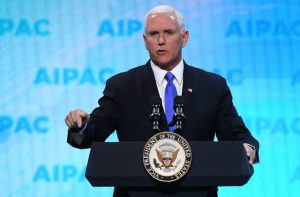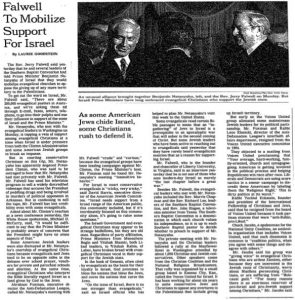“Pence Knocks Democrats Over Their Stance on Israel.” photograph (2019)

This photograph, taken by Jim Watson on March 25th, 2019, was taken at the American Israel Public Affairs Conference (AIPAC) in Washington D.C. The photograph shows the Vice President of the United States speaking at the conference. The photograph highlights the fact that AIPAC, a pro-Israel lobbying group, has immense influence over United States policy, as it can get some of the most powerful Americans, such as the Vice President, to speak at its conferences. In understanding the history between the United States and Israel, it would be negligent to not recognize the immense impact that pro-Israel lobbying groups have had. These groups, such as AIPAC, have such a high level of control over American politicians that it can get some of the most powerful politicians in the United States to speak for them. The photo affirms the strength of AIPAC as it shows the Vice President speaking on its behalf.
“Thousands Rally for Israel: Crisis Generates Impassioned Support for Offensive” photograph (2002)

This picture, taken by James Parcell, shows a pro-Israel rally that took place in Washington D.C. The rally was publicized with less than one week’s notice, but still drew about 100,000 people. The rally was announced in response to acts of terrorism against Israel and was a way for Americans to vocalize their support for Israel. Among those who attended, there were many politicians from the United States and Israel, and there were some Holocaust survivors there, too. The picture, by the Washington Post, demonstrates the sheer strength of America’s support for Israel. At the time of the photo, the United States proved to be strongly behind Israel both politically and in terms of public opinion. The fact that all of the demonstrators were clearly in support of Israel indicates how human rights abuses against Palestinians were dismissed, which shows that the United States favored its relationship with Israel to that of its Arab neighbors.
“The Israel Lobby” Book by John Mearsheimer and Stephan Walt (2002)

This book, “The Israel Lobby”, was written by scholars of International Affairs. In this book, the scholars, John Mearsheimer and Stephen Walt, criticize the strength of the Israel lobby’s influence on policy makers within the United States Government. The book examines the Israel lobby’s power in comparison to the lobbying on behalf of other countries. The authors note that the Israel lobby not only has a disproportionate amount of influence, but that it causes the United States government to make irrational foreign policy decisions on behalf of Israel. This book, which was written in 2002, demonstrates the importance of lobbying groups in the United States, and how they can cause the U.S. government to implement policies that are counter-intuitive to its own interests. A second important aspect of the book was the fact that one of the authors was Jewish, which shows that support for Israel among American Jews was not universal.
“Falwell To Mobilize Support For Israel” (1998)

This article by Laurie Goodstein describes the strengthening relationship between Benjamin Netanyahu, the Prime Minister of Israel, and the Evangelical Church in the United States. Goodstein illustrates the exchanges between Netanyahu and a Reverend Jerry Falwell, a prominent Evangelical pastor in the United States. The article is noteworthy because Falwell was a famous critic of Bill Clinton, the President of the United States at that time. This shows that Netanyahu needed U.S. support, but recognized that he would not get it from Clinton, so the Prime Minister undermined the influence of the President to try to maintain support from the United States. The article is also important because it details the growing relationship between Israel and Evangelical Christians, as well as the fracturing relationship between Israel and American Jews.
